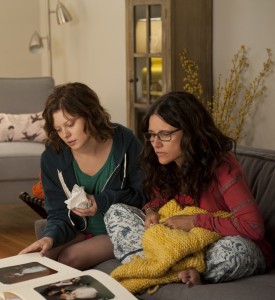Enough Said showcases strong acting
Whether he was menacing Patricia Arquette as a lust-murdering mob enforcer in True Romance, fending off a barrage of Scottish obscenities as In The Loop’s impulsive armchair general or lending his gruff, careworn voice to the tantrum-prone Carol in Where the Wild Things Are, James Gandolfini built his career around playing characters with volcanic tempers.

Can’t get Enough · Julia Louis-Dreyfuss (right) plays the role of Eva, a Los Angeles massage therapist whose love interest (Gandolfini, not pictured) turns out to be the dreaded ex-husband of a close friend. – Courtesy of Fox Searchlight Films
In Enough Said, writer-director Nicole Holofcener’s perceptive, heartfelt comedy about the hazards of middle-aged love, the late actor reveals his range by convincingly inhabiting the soul of a man far removed from the likes of Tony Soprano: a sweet, mild-mannered schlub who only gets miffed when he has to pick the onions out of his guacamole.
Enough Said marks Holofcener’s return to the big screen after a three-year dalliance with Parks and Recreation and Mike White and Laura Dern’s underappreciated HBO series Enlightened. It opens with a day in the life of Eva (Julia Louis-Dreyfus), a high-strung masseuse and single mother determined to sort out her life before her teenage daughter (Tracey Fairaway) departs for college. She’s also dealing with a difficult new client: the beautiful but pretentious Marianne (Holofcener’s on-screen muse Catherine Keener), a celebrity poet who offers prosaic life lessons (and free food from her garden) before launching into well-rehearsed tirades against her boorish ex-husband.
While attending a dinner party on the advice of her best friend Sarah (Toni Collette, finally getting to use her natural Australian accent), Eva meets the shy, self-effacing Albert (Gandolfini), another soon-to-be empty nester who works as an archivist at a nearby museum of television history. The two divorcées hit it off, and before long their flirtations blossom into a full-blown courtship. A second chance at lifelong love seems assured, at least until Eva realizes that Albert is actually Marianne’s first husband, a revelation that causes her to fixate on his every flaw and foible, from his weight problem to his strange aversion to end tables.
That plot twist might seem a tad contrived, but there’s much more to Enough Said than its deceptively simple narrative would suggest. Like Woody Allen, another longtime chronicler of first world problems, Holofcener is extremely adept at creating relatable, lived-in spaces for her characters to inhabit. By allowing Albert and Eva room to develop without the need for much in the way of requisite drama, they become like old friends with pressing business, the kind you wouldn’t dream of turning away.
Holofcener also has a gift for writing gender-specific dialogue that sounds both witty and naturalistic. That’s a welcome rarity, especially in the realm of romantic comedies, which too often read like sitcoms with muted laugh tracks. Holofcener’s last film, 2010’s Please Give, was an unexpectedly poignant look at the nature of middle-class guilt in the first years of the recession.
Dreyfus, who’s only appeared in a handful of movies since the end of Seinfeld in 1998, does an excellent job capturing the queasy, rudderless feeling of a mother struggling to let go of her only child. Some viewers might find her character’s nervous tics and mercurial attitude grating, but it’s important to remember that this is a woman who feels like her entire world is coming to an end.
One of the film’s greatest strengths comes from its willingness to let Dreyfus and Gandolfini’s odd-couple chemistry ferment into what feels like a realistic, warts-and-all relationship. The entire plot is really just an excuse to watch these two play off each other, and both actors embrace their roles with tender, awkward gusto. The scene where they lie in bed together and gently analyze each other’s imperfections carries more dramatic heft and insight than any on-screen pairing you’re likely to see this year.
Keener, a veteran of four previous Holofcener-helmed projects, gives the finest performance of the movie with the exception of Gandolfini, elevating what could have been a stereotypical hag into a humane, fully realized character, while Collette and Ben Falcone (the undercover air marshal in Bridesmaids) provide the majority of the laughs as Sarah and her romantically hapless husband.
In the end though, Enough Said belongs to Gandolfini, and not just because of the full-screen dedication that plays over the closing credits. He was up to something here, polishing his comedic chops for the second act of his post-Sopranos career, something we will never see save for this film and one more, Animal Rescue with Tom Hardy and Noomi Rapace, scheduled for release sometime next year. There’s a gentleness in his eyes when he’s playing Albert, a warmth that was tempered in the past by harder times and heavier roles. It exists now as a reminder of an enormous talent that was taken far too soon.
